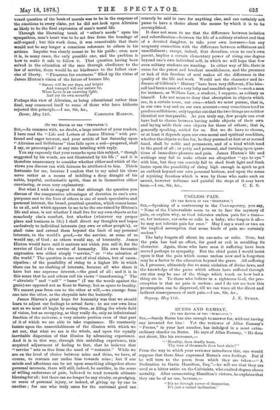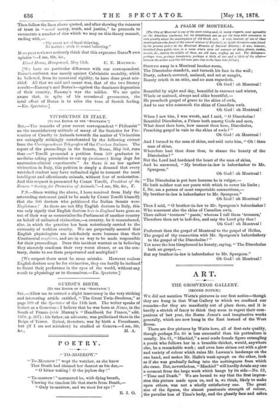BURNS AND RAMSAY. cro THE EDITOR OF THE "SPECTATOR.'] SIR, —.Surely
Burns has sins enough to answer for, without having any invented for him ! Yet the reviewer of Allan Ramsay' "Poems," in your last number, has indulged in a most extra-
ordinary slander on Burns. He says of Allan Ramsay, "He does not shout, like his successor,—
" Morality, thou deadly bane,
Thy tens of thousands thou hest slain!'"
From the way in which your reviewer introduces this, one would suppose that these lines expressed Burns's own feelings. But if be will turn to the poem from which they are taken—" A Dedication to Gavin Hamilton, Esq."—he will see that they are used as a bitter satire on the Calvinists, who exalted dogma above morality. After enumerating Hamilton's virtues, he explains that they can be of no use, because,—
" It's no through terror of damnation, It's just a carnal inclination."
Then follow the lines above quoted, and after showing the vainness of trust in "moral mercy, truth, and justice," he proceeds to enumerate a number of sins which we may on this theory commit, ending with,—
" Ply every art of legal thieving,
No matter ; stick to sound believing."
llJes your reviewer seriously think that this expresses Burnet own opinion ?—I am, Sir, &c., Eland House, Hampstead, May 11th. C. E. MAURICE.
[We have no particular difference with our correspondent. Burns's outburst was merely against Calvinistic morality, which he believed, from its unnatural rigidity, to have done great mis- chief. All that we said and meant was, that of the two literary revolts—Ramsay's and Burns's—against the dominant dogmatism of their country, Ramsay's was the milder. We are quite aware that, in spite of his occasional grossnesses, the total effect of Burns is to raise the tone of Scotch feeling. —En. Spectator.]



































 Previous page
Previous page